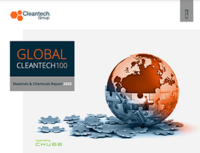Electric Vehicle Batteries, Concrete and Chemical Manufacturing: Innovative Thinking from Cleantech Forum Europe
How will we take aggressive steps toward addressing industrial emissions? Address the increasing demand for downstream materials to meet the demands of the electric vehicle market? The sustainable production of materials and chemicals was a key theme among leading industry stakeholders at Cleantech Forum Europe 2021.
The cement industry needs to act quickly to meet emissions targets
Concrete will remain a critical material for the construction industry, yet the cement needed for its production results in difficult to manage emissions. During the Forum, we discussed critical pathways for the decarbonisation of cement including carbon capture technologies and alternative cements with OGCI, Svante and Ecocem.
Low-carbon products face many challenges including cost, market pull for green products and disconnected standards. Carbon pricing and/or incentives are needed to level the playing field against high emission production, and green procurement policy can play an important role in driving demand for green cement. Despite the larger investments into the technology space in the past couple of years, more support will be needed to address the colossal emissions of the cement industry in a timely manner.
Industry is responding to demand signals, but more needs to be done to address the sustainability of producing critical battery materials
The electric vehicle revolution will drive huge growth in production of lithium-based batteries. Yet the extraction and refining of the required battery materials comes with both environmental and ethical costs. Our discussion on critical battery materials with Roland Berger and Circulor highlighted challenges with ethical and sustainable production of critical materials including cobalt and nickel. The need to consider a lifecycle approach cannot be overlooked.
Lithium stocks are likely to last, but the challenges of producing in sufficient and quantity and quality were highlighted in discussion with lithium producer, European Metals. Recycling, new sources and production techniques such as direct lithium extraction can help address some of the demand. Meanwhile, public investment and collaboration from industry organisations such as the European Battery Alliance is helping to drive investment into critical projects. Policy and public funding have an important role to play if the EV revolution is to be realised.
Innovators hope to scale production with a flexible approach to biological manufacture of chemicals
Biological manufacture of chemicals remains an important route to increase circularity and lower emissions of the chemicals industry but historically production has economic and technical challenges. During our session on biobased chemicals, Capricorn Partners, Enginzyme, c-LEctra and DMC Biotechnology discussed how the manufacture of chemicals using biological processes is increasingly viable – but mostly for high value products. High volume chemicals production remains a target, but first demonstrating viability of process with high value molecules is a key focus for innovators looking to progress into this area.
The route to production is a critical factor in success. There are many historical high-profile failures from companies too keen to ‘get steel in the ground’. Innovators now pursue a more flexible approach, utilising contract manufacturing when appropriate. We also heard how financing in this area has become increasingly easier to access as the geopolitical and macroeconomic trends support greater investment in the sector.



